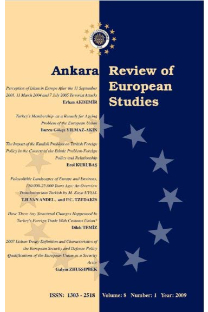Avrupa Birliği’nin Dış İlişkileri ve Politikası: Avrupa Birliği’nin Bütünleş(eme)mesi Üzerine Bir İnceleme
Kurumsal anlamda Avrupa Birliği (AB), uluslararası arenada küresel
ısınmadan, Ortadoğu barış sürecine, Afrika’daki siyasal ve ekonomik
azgelişmişlikten, mülteci ve sığınmacı sorunlarına kadar uzanan geniş bir yelpazede
çeşitli ulusal, uluslararası, bölgesel ve küresel aktörlerle ilişkiler yürütmekte ve
diplomatik temaslar sağlamaktadır. AB aynı zamanda bu ilişkilerini yürütürken çeşitli
politikalar da takip etmektedir. Ancak AB’nin dış ilişki kurmakta ve diplomatik
temaslar yürütmedeki başarısını politika ortaya koymada ve uygulamada
görememekteyiz. Bu itibarla bu çalışma AB’nin dış politikasını ve dış ilişkilerini
analiz ederek dış ilişkilerdeki yetkinliğin dış politikaya neden yansımadığını
araştırmaya çalışacaktır.
Anahtar Kelimeler:
Avrupa Birliği, Dış ilişkiler, Dış politika, AB Dış İlişkiler Eylem Servisi
Foreign Relations and Policy of the European Union: A Review on the (Dis)Integration of the European Union
Institutionally, the European Union (EU) is engaged in and conducts diplomatic
contacts with a variety of national, international, regional and global actors in a wide
range of countries, from global warming to the Middle East peace process, from
political and economic underdevelopment in Africa to refugee and asylum issues. At the same time, the EU is following various policies while carrying out these
relations.However, the EU cannot show its success in establishing foreign relations
and conducting diplomatic contacts in policy formulation and implementation. In this
respect, this study will analyze the foreign policy of the EU and its external relations
and try to investigate why external competence does not reflect the foreign policy.
___
- Baykal, Sanem. “Avrupa Birliği’nde Yetki Sorunu ve Lizbon Antlaşması.” Avrupa Birliği’nin Güncel Sorunları ve Gelişmeler. Belgin Akçay, Sevilay Kahraman ve Sanem Baykal (Der.), Ankara: Seçkin, 2008.
- Canbolat, S. İbrahim. Avrupa Birliği: Uluslarüstü Bir Sistemin Tarihsel Teorik Kurumsal Jeopolitik Analizi ve Genişleme Sürecinde Türkiye ile İlişkiler, Bursa: Alfa Yayınları, 2002.
- Elmas, Yılmaz, Fatma. Avrupa ‘Kapı Duvar’: Göç Yaklaşımında Söylem-Eylem Tutarsızlığı, Ankara: USAK Yayınları, 2016.
- Emmanouilidis, A. Janis. “Alternatives between Full Membership and NonMembership – Fata Morganaor Silver Bullet?”, Paper for the conference The EU and itsNeighbours: In Search for New Forms of Partnership, Sounio: 2008.
- Gözen, Ramazan. “Dış Politika Nedir?”, İdris Bal (Der.), 21. Yüzyıl Eşiğinde Türk Dış Politikası, İstanbul: Alfa Yayınları, 2001.
- Günuğur, Haluk. Lizbon Antlaşması Sonrasında Avrupa Bütünleşmesi, Ankara: Avrupa Ekonomik Danışma Merkezi Yayını, 2012.
- Hadeshian, Nanar. “European Union’s External Relations: More Consistency?”, Yearbook of Polish European Studies, Warsaw: Centre for Europe (2010): 107-127.
- Moussis, Nichola. Avrupa Birliği Politikalarına Giriş Rehberi. Ahmet Fethi (Çev.), İstanbul: Mega Press, 2004.
- Müller, Patrick. ve Nicole Alecu de Flers, Applying the Concept of Europeanization to the Study of Foreign Policy: Dimensions and Mechanisms, Institute for European Integration Research, Working Paper Series, Working Paper No. 05/2009, Viyana: 2009.
- Nugent, Neill. The Government and Politics of the European Union, Durham: Duke University Press, 2006.
- Schmidt, Julia. “Common Foreign And Security Policy And European Security And Defence Policy After The Lisbon Treaty: Old Problems Solved?”, Croatian Yearbook of European Law and Policy 5, (2009): 239-259.
- Sezer, Duygu. Kamuoyu ve Dış Politika, Ankara Üniversitesi SBF Yayınları No: 339, Ankara: Sevinç Matbaası, 1972.
- Sjursen, Helene. “Not so intergovernmental after all? On democracy and integration in European Foreign and Security Policy.” Journal of European Public Policy 18, no 8 (2011): 1078-1095.
- Smith, E. Karen. “Understanding the European Foreign Policy System”, Contemporary European History 12, no 2 (2003): 239-254.
- Tangör, Burak “Güvenlik Yönetişimi Yaklaşımı ve Avrupa Güvenlik ve Savunma Politikası”, Gazi Üniversitesi İktisadi ve İdari Bilimler Fakültesi Dergisi 6, no 3 (2004): 253-268.
- Uzgel, İlhan. Ulusal Çıkar ve Dış Politika, Ankara: İmge Kitabevi, 2004.
- Wessels, Wolfgang ve Franziska Bopp, “The Institutional Architecture of CFSP after the Lisbon Treaty: Constitutional Breakthrough or Challenges Ahead?” Brussels: CEPS (Centre for European Policy Studies) Research Paper No. 10, 2008.
- White, Brian. Understanding European Foreign Policy, Houndmills: Palgrave, 2001.
- White, Brian. “Foreign policy Analysis and European Foreign Policy.” Rethinking European Union Foreign Policy, Ben Tonraand Thomas Christiansen (Der.), Manchester & New York: Manchester University Press, 2004.
- Wouters, Jan ve Thomas Ramopoulos, Revisiting The Lisbon Treaty’s Constitutional Design of EU External Relations, Leuven Centre for Global Governance Studies, Working Paper no 119, Leuven: 2013.
- ISSN: 1303-2518
- Yayın Aralığı: Yılda 2 Sayı
- Başlangıç: 2001
- Yayıncı: Ankara Üniversitesi Avrupa Toplulukları Araştırma ve Uygulama Merkezi
Sayıdaki Diğer Makaleler
Erasmus+ Programı ile Türkiye'den Gerçekleşen Uluslararası Öğrenci Hareketliliğinin Analizi
Döngüsel Ekonomiye Geçiş Doğrultusunda Yeni Tedbirler ve AB Üye Ülkelerinin Stratejileri
Polbud Kararı Sonrasında İş Kurma Serbestîsinin Kapsamı ve Şirketlerin Sınıraşan Tür Değişikliği
